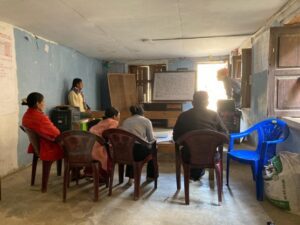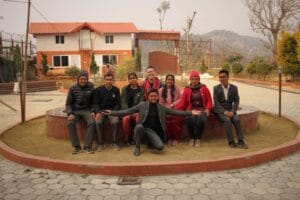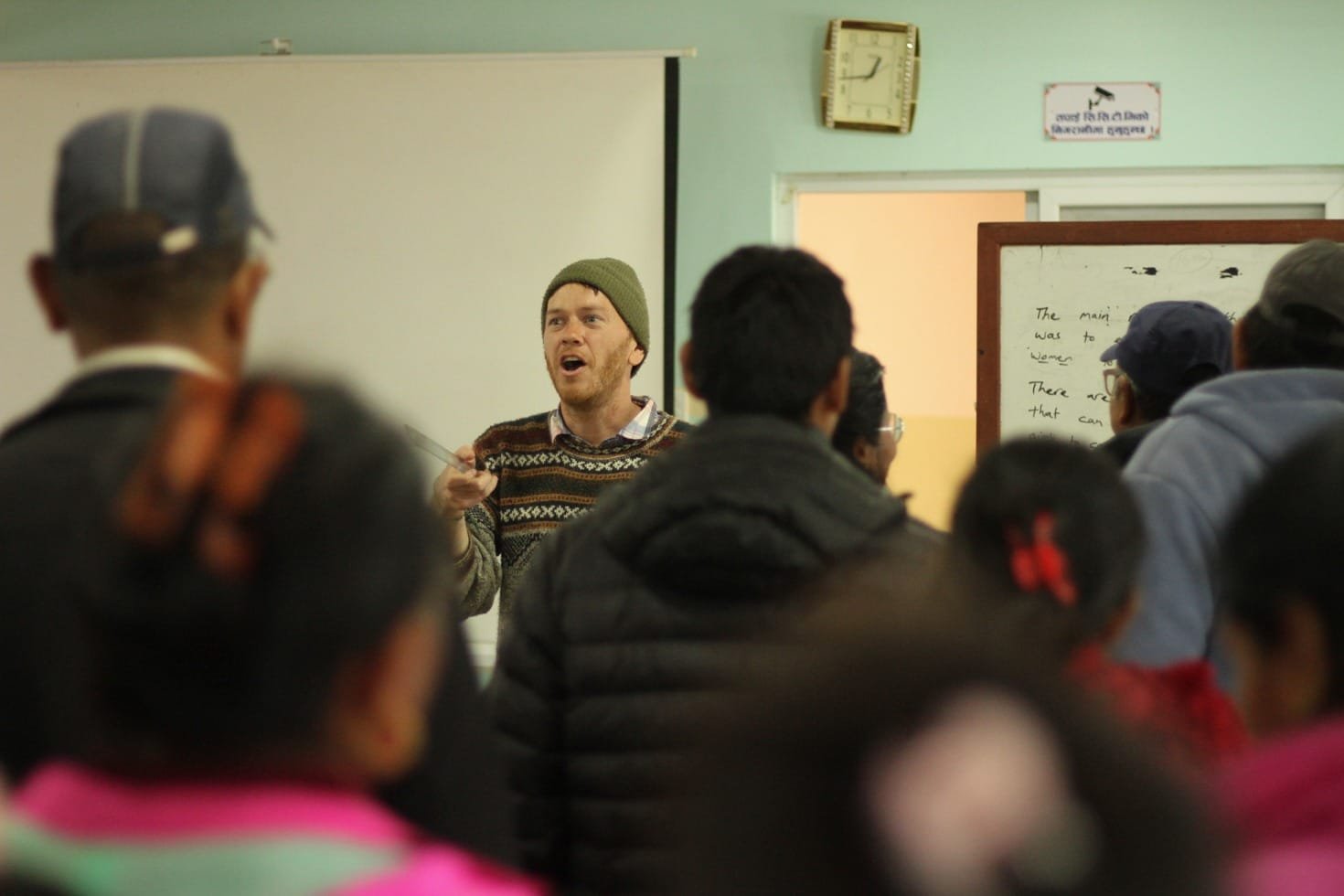For three months in 2024, I volunteered as a teacher trainer in Okhaldhunga (Nepal) in the shadow of the majestic Himalayas. I did two different kinds of teacher training: one was English Language Training (ELT) for English teachers which ran regularly for just over a month, and the second was General Basic Level (GBL) training for teachers of all subjects which ran for two iterations of 4-days.

English language training in Bhadaure

English language training class, Nishanke
For the ELT training, I created all the resources using a communicative topic-based approach, and a book called ‘Keep Talking’ by Friederike Klippel (which I left in the library). For the GBL training, I followed a sequential process: first, I observed classes in community schools to gather data; secondly, I led teacher training with support from VIN staff and volunteers in Nishanke and; finally, I returned to schools to check-in with teachers, and to learn how they were implementing training. This report will focus on the GBL training process.

Observation
When I first arrived in Okhaldhunga, I spent a couple weeks visiting different schools in the local area to observe classes. I walked from the NaraTika Community Learning Centre (CLC) in Nishanke to a number of schools in the surrounding area (Taluwa, Bhadaure, and Tulachap). I walked with VIN staff and sometimes other volunteers doing the Disaster Risk Reduction (DRR) project. I enjoyed these outings because the landscape is magical, and I love keeping fit – be prepared for long walks if you come to this part of the world!
The schools included both secondary level as well as basic levels of education. Also, every school was unique: for example, some had more facilities and some less. The classroom conditions were often basic. I noticed that VIN has supported the construction of Early Children’s Development (ECD) centres in several schools. During this initial observation, I delivered some impromptu mini-lessons which were fun, and I think it proved a valuable way to advertise what the teacher training would include. For these taster sessions, I focused on short interactive and communicative activities which engaged students (such as songs, simple games like ‘change chairs if’ etc.).
General basic level (GBL) training

Once this initial observation period finished, I spent a few days preparing for the General Basic Level (GBL) training using resources provided by VIN as a reference. I complemented these materials with my own teaching books, experience using a communicative language teaching (CLT) approach as well as experience teaching English for Academic Purposes (EAP). Also, I took advantage of educational materials and lesson plans freely available online such as those from “British Council” linked websites.
The GBL training targeted primary level and was created for teachers of all subjects. From my perspective, this general level training was both rewarding and challenging because many of the teachers had a low level of English. Due to this, I adapted activities to reduce the linguistic load on participants and I utilised online translation tools such as Google Translate. More specifically, I encouraged all the teacher participants who had a smartphone to install the Google Translate application and download Nepali and English so that they could use the app offline. (This is useful in case of power cuts and loss of internet connectivity which is commonplace in the region.)
The support of VIN staff for live translations from English to Nepali during the training was also invaluable. Such language scaffolding helped to make the training content more accessible for all participants. Besides that, I also have to commend the hard work of Didi, Buhini, and Thulo Bhai for all of their hardwork keeping everyone fueled with Dhalbhat and other local delicacies.
As a team, we ran two iterations of GBL training with each one lasting four days. Day 1 was about ‘Introductions and Building a Climate for Learning’; Day 2 related to ‘How to teach new content communicatively’; Day 3 ‘How to check for understanding’ and Day 4 was about ‘Practice and lesson planning’. Each 4-day programme included a range of communicative activities, songs and games to inspire and motivate learners.
We considered teaching strategies such as ‘Bloom’s Taxonomy’ and the ‘Spiral Curriculum’ as well as planning tools like ‘I do, We do, You do’. Sometimes we held more teacher-led didactic sessions, and at other times we did more student-led group work. We also went outside occasionally to sing songs (e.g., Hokey Kokey, The Princess Pat) in a big group or play simple games (e.g., Change seats if… 7-up game). For me, the key to a successful training session was keeping a good balance, having a plan and being ready for the next day.

Check-in
With one week left in Okhaldhunga, I visited local schools to check-in with teachers who attended training. This check-in was important to see how teachers were implementing the training in their classes with students.
Additionally, I had the opportunity to visit a private school in Nishanke on two consecutive days. It was encouraging to observe the good discipline, high motivation and general ability of the students there.
Holistic experience
Going to Nepal and volunteering with VIN is about more than simply one project or another. VIN’s big goal is to empower marginalized communities which means that ultimately all volunteers and staff are working together to help people. It is a process as much as a goal!
Through VIN, I enjoyed meeting and talking with volunteers from all over the world: France, The Netherlands, Italy, Singapore, USA, Germany etc. I had fun learning about their projects and their personal goals. We explored the area too: running and hiking to Okhaldhunga town, going on a trip to Pattale to glimpse Mt. Everest and visiting Halesi with its temples. In Nishanke, we became momo aficionados – momos are delicious dumpling-like snacks – as well as Horlicks enthusiasts – a warm and nutritious drink. We watched some of the local puja or festivals like Saraswati Puja. I also appreciated the time playing football with the local children.

Life in rural Nepal is not always easy but I am happy that I decided to come here with the intention to make a positive difference. I recommend this programme to anyone who has a strong desire to make a lasting impact. If you are adaptable, and willing to work you will be of great benefit.
The Future of Teacher Training
Nepal needs more teacher training. This is a fact which is evident both from informal conversations with Nepalese people from different regions (e.g., Kathmandu, Okhaldhunga etc.) as well as formal publications (e.g., see Shrestha and Gautam, 2022).
I have written a research proposal for a PhD which aims to support the further development of teacher training in rural areas of Nepal.
The proposal relates to training in Content and Language Integrated Learning (CLIL) which is a popular paradigm within education (Coyle et al., 2010). CLIL is defined by dual focused instruction in schools which means that both subject (e.g., science) and target language (e.g., English and/or Nepali) are taught at the same time. CLIL is a holistic approach to learning which involves the 4Cs: community (contextual understanding), content knowledge (subject literacy), cognition awareness (e.g., students’ developmental stage) and communication (e.g., language literacy).
My idea is to combine CLIL training with multilingualism in remote Nepalese communities. For example, awareness of languages like Magar, Tamang and Rai. One way to do this would be to train teachers in the use of translanguaging in their classrooms. Translanguaging refers to ‘the planned and systematic use of two [or more] languages for teaching and learning inside the same lesson’ (Williams as cited in Lewis et al., 2012 p.643). Therefore, if accepted onto a PhD programme, I aim to return to Nepal in the near future to complete further teacher training with the support of VIN and the Open University (OU).
My goal is to give communities the tools needed to deliver their educational goals in a socially just way which respects Nepal’s great diversity.
Favourite motivational quotes
‘Nepali powder!’ – dusty roads
‘Dhalbhat power 24 hour!’
‘Do your best, forget the rest’
‘Every bird flies with its own wings’
– Tanzanian Proverb

Nepal needs teacher trainers
[courtesy of Microsoft Bing AI]
References
- Coyle, D., Hood, P. and Marsh, D. (2010). CLIL : content and language integrated learning. Cambridge, UK; New York: Cambridge University Press.
- Lewis, G., Jones, B. and Baker, C. (2012). Translanguaging: origins and development from school to street and beyond. Educational Research and Evaluation, [online] 18(7), pp.641–654. doi:https://doi.org/10.1080/13803611.2012.718488.
- Shrestha, P.N. and Gautam, G. (2022). English language teaching, learning and assessment in Nepal: Policies and practices in the school education system. [online] Kathmandu: British Council, pp.38–39. Available at: https://www.researchgate.net/publication/360139802_English_language_teaching_learning_and_assessment_in_Nepal_Policies_and_practices_in_the_school_education_system/link/626407dd1b747d19c2a1a6cd/download?_tp=eyJjb250ZXh0Ijp7ImZpcnN0UGFnZSI6InB1YmxpY2F0aW9uIiwicGFnZSI6InB1YmxpY2F0aW9uIn19 [Accessed 27 March 2024]


 Member of
Member of